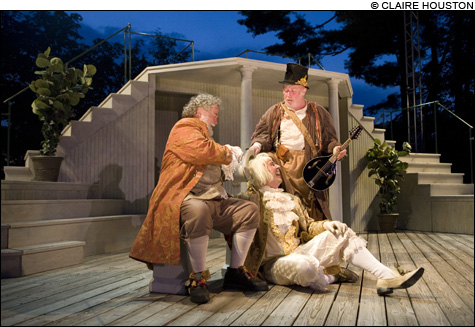
DEFINITELY WORTH A TRIP Freeport Shakespeare Festival’s Twelfth Night. |
Trickery and dissembling around love have one role or other in just about everything Shakespeare wrote, though he lays it on particularly thick in Twelfth Night: Not only does a woman dress as a man, cueing the expected romantic fracas, but the household's drunkards and wits also scheme a cruel amorous comeuppance for the butler. The Freeport Shakespeare Festival's Twelfth Night — its second annual open-air performance, free to the public in L.L. Bean's Discovery Park — is highly recommended not just because its antics are beautifully produced and scintillatingly acted, but because director Dennis McLernon also pays unusual, subtle, and arresting attention to the consequences of those antics.
A refresher on the chicanery: The woman disguised is Viola (Jordana DeZeeuw), whom a shipwreck has separated from her identical twin brother Sebastian (J.P. Guimont). Calling herself Cesario, she gets herself a job serving the Duke Orsino (James Noel Hoban), whom she promptly falls for, but who's hopelessly in love with the recently bereaved Countess Olivia (Tyler Layton). Orsino sends Cesario over with love tokens to Olivia, who finds herself taken with the fresh-faced emissary. Meanwhile, Olivia's drunken uncle Sir Toby Belch (Michael Howard) and hapless suitor Sir Andrew Aguecheek (Matthew Power) join forces with Olivia's servant Maria (Julie George-Carlson) to abuse major domo Malvolio (Will Rhys) with false intimations of his mistress's love for him.
The comedy plays out with luxurious production values on FSF's multi-level stage; this Shakespeare is decidedly not naked. Rather it comes with an intricate light plot, body mics, decadent Victorian-styled costumes, and a marvelous, overwhelmingly Equity cast — the majority of which, I am gratified to report, are local actors, a decision I hope FSF continues to embrace.
The first deception is launched by Viola, as whom the superb DeZeeuw is fierce, sleek, and fluent, not to mention gorgeous, with a mane of blond hair whose reappearance at the end, after being hidden down Cesario's collar for two acts, is a fulfillment in and of itself. The more malice-driven deceivers are a hoot: George-Carlson's Maria is sharp and lively, and Howard is a pleasure, as always, as everybody's favorite drunken rascal of an uncle. As the fool Feste, Paul D. Farwell helps amplify the shenanigans gamely (though is perhaps over-directed in how the fool sees through Cesario); and Power's hilarious fop of a Sir Andrew, in a platinum-blonde bob and silky pantaloons, is priceless. Power also does a fine, quiet job of balancing Andrew's simple vanities, which all the schemers have, with a simple sweetness lacking in his smarter co-conspirators: After he presents a distraught Olivia with a flower and a brave, hopeful smile, her rejection shows him sadly, utterly, eternally confused by love's hard ways.
As is Malvolio, though he sustains much crueler wounds. Rhys is excellent as the starchy, arrogant servant, particularly because his Malvolio doesn't begin the show in exaggerated comic form. This gives him plenty of room for the arc to his cross-gartered climax, and also lends his public humiliation a pathos that's not always there — enough so that you may well feel sympathy for the poor, repressed prig.